2007.08.15: August 15, 2007: Headlines: Figures: COS - Malawi: Writing - Malawi: John Coyne Babbles: Paul Theroux: Peace Corps Writer
Peace Corps Online:
Directory:
Malawi:
Special Report: RPCV Paul Theroux:
Paul Theroux: Newest Stories:
2007.08.15: August 15, 2007: Headlines: Figures: COS - Malawi: Writing - Malawi: John Coyne Babbles: Paul Theroux: Peace Corps Writer
Paul Theroux: Peace Corps Writer
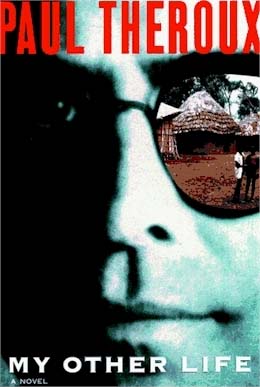
Paul Theroux began by writing about the life he knew in Africa as a Peace Corps Volunteers His first first three novels are set in Africa: Fong and the Indians, Girls at Play, and Jungle Lovers. Jungle Lovers focuses on Malawi where Paul was a PCV. Two of his later novels, My Secret History and My Other Life, recast his Peace Corps tour as fiction. Read John Coyne's analysis and appreciation of one of the greatest writers to come out of the Peace Corps.
Paul Theroux: Peace Corps Writer
by John Coyne
1. Peace Corps Writer: Paul Theroux
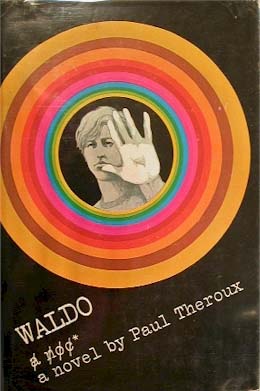
He went - in the way the Peace Corps rolls the dice of our lives - to Africa as a teacher. "My schoolroom is on the Great Rift, and in this schoolroom there is a line of children, heads shaved liked prisoners, muscles showing through their rags," he wrote home in 1964. "These children appear in the morning out of the slowly drifting hoops of fog-wisp. It is chilly, almost cold. There is no visibility at six in the morning; only a fierce white-out where earth is the patch of dirt under their bare feet, a platform, and the sky is everything else."
How many of us stood in front of similar classrooms and saw those young faces arriving with the dawn? How many of us could have written the same sentiments - though not the same sentences - home? And how many of us wanted to be the writer that he became, the free spirit roaming the world, jotting down notes and writing novels, travel books, short stories and essays?
In forty-plus years of writing, that RPCV, Paul Theroux (Malawi 1963-65), has produced some of the most wicked, funny, sad, bitter, readable, knowledgeable, rude, contemptuous, ruthless, arrogant, moving, brilliant and quotable books ever written.
He began by writing about the life he knew in Africa as a Peace Corps Volunteers His first first three novels are set in Africa: Fong and the Indians, Girls at Play, and Jungle Lovers. Jungle Lovers focuses on Malawi where Paul was a PCV. Two of his later novels, My Secret History and My Other Life, recast his Peace Corps tour as fiction.
In 1996 his first three novels were reissued by Penguin as On the Edge of the Great Rift, a 644-paperback. Also reissued was Sunrise with Seamonsters, his 1985 collection of essays, as well as his novel My Other Life. In 1997 Viking Publishers pulls together than 60 of his short stories in a massive 660-page hardcover collection. His 2002 travel book, Dark Star Safari brought Theroux back to Africa and had him traveling from Cairo to Cape Town. His next book [fall of 2007] is entitled The Elephanta Suite and is set in India where "A holidaying middle-aged couple veer heedlessly from idyll to chaos. A buttoned-up Boston lawyer finds relief in Mumbai's reeking slums. A young woman befriends an elephant in Bangalore." Theroux is also working on two more travel books, The Cold World about the polar regions, and a revisit to the places written about in The Great Railway Bazaar. There is also talk about a novel entitlted, Mother.
A number of thematic patterns emerge from Theroux's work. One that runs through many of his books clearly relates to his experience as a Volunteer in Africa, and these books, I think, are his most ambitious and creative. In upcoming 'blogs' I'll review Paul's Peace Corps history and how the agency and the experience influenced his life and work. In my opinion it was in Africa, in the Peace Corps, that Paul Theroux found his literary landscape, his point of view, and his voice.
2. A Crack in the Earth
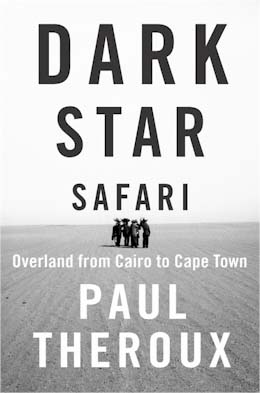
In 1964 Paul Theroux was a Peace Corps Volunteer in Nyasaland (as Malawi was called before independence), living on the edge of "a crack in the earth," as he wrote in a letter home to The Christian Science Monitor. That same year I was a PCV farther north, up in the highlands of Ethiopia, a few hours east of the Great Rift. Though our years in Africa overlapped, I didn't know Theroux then. But I heard of him. By the time he was 23, his outspokenness had already made him notorious within the Peace Corps.
In the fall of 1965, I returned to Ethiopia as an Associate Peace Corps Director (APCD), and Theroux appeared as a central character in a story that swept through Peace Corps/Africa. The Peace Corps CD in Malawi had been sent home by the U.S. Ambassador, Sam P. Gilstrap.
It seems that the Malawi PCVs had started a Volunteer newspaper called The Migraine, and its editor had written a piece opposing the American presence in Vietnam. When the Ambassador, an old and dear friend of President Lyndon Johnson, saw the newspaper, he expelled the country director, Michael McCone (Staff: Sierra Leone, Malawi, Malaysia 1962–66), for allowing publication of the editorial - which had been written by Paul Theroux.
Will Lotter, Deputy Director of the Malawi Peace Corps project (1965–67), said it was Theroux's article that first made him aware of the anti-war movement among young Americans. "I came off the Davis campus in California. I had been an athletic coach and Paul opened my eyes to our folly in Vietnam."
And if they read his editorial, most Volunteers overseas would have agreed with Theroux, though many Volunteers did support U.S. military activities in Asia, at least in 1964. (It wasn't until 1965-66 that male PCVs began to join the Peace Corps to avoid the draft.)
But what was Ambassador Gilstrap thinking? Didn't every ambassador know PCVs always mouthed off against U.S. foreign policy, even while eating all the hors d'oeuvres at every embassy reception? If anyone lacked good judgment, it was Sam P. Gilstrap. [We had another example of this recently in the Peace Corps where the Tanzania U.S. Ambaassador, Michael Retzer, kicked Peace Corps CD Christine Djondo out of the country when she refused to leave voluntarily.In the recent Tanzania situation, her PCVs rallied to her cause.]
I remember sitting in my office in Addis Ababa and reading cable traffic about the incident. Country Director Mike McCone was back in Washington being interviewed by Sargent Shriver and waiting for a decision on his Peace Corps future.
About that same time, it was learned that a Volunteer in Malawi had been declared persona non grata by Dr. Hastings Banda, the Prime Minister, not for protesting the Vietnam war but for supporting Yatuta Chisiza, a Malawian whom Banda suspected of trying to overthrow his government. The PCV in question was Paul Theroux.
3. Persona non grata
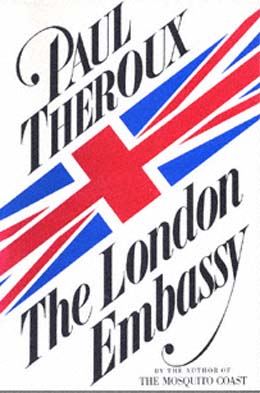
Paul Theroux lived, not only on the edge of the Rift, but also on the edge of the Peace Corps. He was the Volunteer who lived in the African village without servants. He drank in the shanty bars instead of with the Brits at their gymkhanas. He went home with African women and did not date the pale daughters of British settlers when they came home on holidays from their all-white Rhodesian boarding schools. He hated the PCVs who ran with the ex-pats, the "wog bashers," as they called themselves. But though he held himself apart from his fellow PCVs, Theroux was, according to his country director, Michael McCone, "an outstanding teacher who lived up to the Peace Corps standard of involvement in his school." And it was this very involvement with his fellow teachers and African friends that finally got him into big trouble.
"Two months before I was supposed to leave," Theroux recalled in a 1971 essay published in Esquire and reprinted in Sunrise with Seamonsters, "I was charged with conspiring against the government. All I did was help several Africans: help one's mother, help another with his car, maybe write a few mild anti-[U.S.] government articles. But I was linked to a plot to assassinate Hastings Banda. Well, people I knew were actually trying to shoot Banda. So it was more guilt by association."
Theroux came home to be interrogated by the State Department and the Peace Corps.
Writing about this in Esquire, under the title "The Killing of Hastings Banda," Theroux explained how he had innocently gotten mixed up with the German equivalent of the CIA. He was writing "background" pieces for what he understood was a German magazine, but what was actually their intelligence service. This, of course, was - and still is - against Peace Corps regulations.
The "background pieces" eventually went to The Christian Science Monitor and were his first published writings on Africa. These essays saved him, as he writes in the introduction to Sunrise with Seamonsters, "from dropping back into the schoolroom, or into the even more dire profession of writing applications for grants and fellowships."
Theroux wasn't kicked out of the Peace Corps for writing articles about Malawi, but toward the end of his second year as a Volunteer he made the mistake of helping a Malawian friend, David Rubadiri, a former headmaster of Theroux's school and later a delegate to the United Nations. Rubadiri had recently been denounced by Hastings Banda, had left the U.N. in New York, and was living in political exile in Uganda.
Rubadiri wrote to Paul from Uganda, "asking me if I could find it in my heart to help his mother flee the country, and also would I mind driving his car to Uganda with his set of best china, a dinner service for twelve."
Theroux, as a favor to his friend, did transport the car, the mother and the china to Kampala. On his way back to Malawi by plane, and at Rubadiri's request, he flew via Dar es Salaam, Tanzania to deliver an envelope to Yatuuta Chisiza, a revolutionary who had organized an army that was attacking Malawi border posts in hopes of eventually overthrowing Banda.
As Theroux wrote in Esquire, "My readiness to say yes to favors may suggest a simplicity of mind, a fatal gullibility; but I was bored." Next he carried a coded message from Yatuuta Chisiza to a "Greek fellow" in Malawi's capital, Blantyre, When Theroux delivered him the message - that on October 16 the Greek baker was to deliver his bread to Ncheu, a town thirty miles from Blantyre - the baker "trembled and went pale."
Later, in a Chinese restaurant in Salisbury, Rhodesia, Theroux was told by Wes Leach, the Peace Corps Associate Director (Staff: Malawi 1964–66), that Banda told the American ambassador that Banda had proof Theroux was plotting to kill him. Banda demanded the Volunteer be sent home.
Theroux guessed the Greek baker had been caught, interrogated by the Malawi Criminal Investigation Department about the "bread van" and, frightened for his own life, set up the American messenger. Using Theroux's name, government agents established correspondence with Chisiza in Dar es Salaam. Later, instead of finding "bread" waiting in a van, Chisiza found Malawi soldiers, who ambushed and killed the revolutionary gunmen from Tanzania.
For a while, Theroux thought he might also have been expelled from Malawi because of an English textbook he was writing. With no resources but some inappropriate grammar books from Kansas and a set of Sir Walter Scott's Waverly novels donated by the English Speaking Union in London, Theroux and a Malawian linguist had begun writing a textbook that concentrated on verb patterns and sentence structure, rather than the usual grammar punctuation of subordinating conjunctions, adjectival phrases, and dependent clauses. At some point, the textbook was shown to Hastings Banda, and in a speech before Parliament he attacked certain teachers of English, and Paul's textbook in particular, because it contained no grammar lessons. Banda was furious, calling the book a "nonsensical linguistic approach."
Although Banda used the textbook to attack him, it was not Theroux's sentence structure but his association with various Malawians trying to overthrow the government that finally got him kicked out of the country and the Peace Corps.
[In 1971 Dr. Hastings Kamuzu Banda declared himself Malawi's President for Life after an attempted revolt within his cabinet. He ruled Malawi until 1994 when he was finally lost power. On November 25, 1997, he died of respiratory failure in Johannesburg, South Africa, having been transferred there from a Malawian hospital suffering from pneumonia and fever. The Garden City Clinic, where he died, said he was 99, but government documents during his rule would have made him about 90. He was given a state funeral on December 3, 1997, with a 19-gun salute and military honors.]
4. Up and Out of the Peace Corps
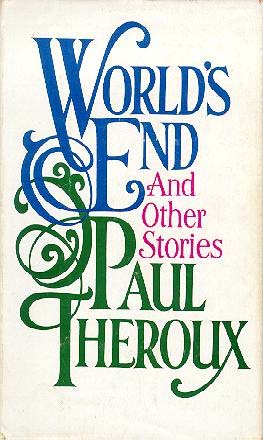
Sent home from Africa, Theroux stayed at the Claridge Hotel in Washington, D.C., around the corner from the original Peace Corps Headquarters, then at 806 Connecticut Avenue in the old Maiatico Building. The quaint and small Claridge Hotal was the "Peace Corps" hotel and a steady stream of staff, would-be staff, and PCVs back from overseas stayed in its tiny rooms off of Farragut Squire. Next door to the hotel was the Chez Francois, the agency's hang-out restaurant, with its outside tables and view of Lafayette Park, and the White House itself just beyond the leafy trees. Meals at Chez Francois cost more than what PCVs could afford and Theroux ate at the Hot Shoppe next to the Maiatico Building. Theroux was in and out of the Claridge Hotel in less than a week. Terminated early, the Peace Corps added to his misery by deducting his airfare from Africa to Washington from his readjustment allowance. He was left with $200 - not much, even in 1965.
There was talk at the time--Warren Wiggins would tell me years later--that Theroux "might be" a CIA plant. His older brother [later his literary agent] was, after all, working at the State Department. Wiggins was one of the top officials at the Peace Corps and still he had no idea if the Peace Corps wasn't being "used" by the CIA. The problem was Theroux himself: he had, in the eyes of the Peace Corps Administration, behaved strangely in Africa. The agency didn't know what he was about. What was Theroux 'real' agenda? Well, it could have been simply that he was gathering material to write about.
Theroux, out of the Peace Corps, out of money, went back to Africa. African friends got him a job at Makerere University in Uganda, where he was appointed director of the university center for adult studies in Kampala. Makerere University was for many, many years the finest university in Africa, one of the finest universities in the world.
By October, 1967, Theroux was in trouble again, this time with the Ugandan government. He published an essay in the wonderful, and briefly published, Transition magazine, entitled, "Hating the Asians," a report on the mounting prejudice directed at East Africa's Indian population. The Uganda government protested and letters were written saying that there was no bigotry in Africa and that the Indians could have anything they wanted. Five years later, Idi Amin deported all of Uganda's Asian population and confiscated their property. [Mo Tejani (Thailand 1979-81) would write about this in his book A Chameleon's Tale, published in 2006.] But by then Paul Theroux had left Africa for the second time.
His four-year contract at Makerere University was important to Theroux for two reasons. In Kampala, he met and became friends with V.S. Naipaul, who, Paul recalls: "close attention to my writing (often he would go over something I had written word by word) had a profound influence on me." [In 1972, Theroux would publish V.S. Naipaul, an Introdcution to His Work. This gushing portrait of Naipaul would be corrected by a caustic portrait of the Nobel Laureate Naipaul by 1998. Theroux's second book on his mentor, Sir Vidia's Shadow, details his falling out with Naipaul.]
Also at Makerere Theroux met Anne Castle, a British teacher at an upcountry girls' secondary school in Kenya. [Anne and Paul married in 1967 and had two sons, Marcel and Louis. They divorced in 1993.] In 1995, Theroux published "A. Burgess, Slightly Foxed: Fact and Fiction" that appeared in The New Yorker (August 7,1995). This piece describes a dinner at Theroux's home with Anthony Burgess and "a book-hoarding philistine lawyer who nags the narrator for an introduction to the great writer." The "narrator's wife" is named 'Anne.' This story is a wild and messy account of "Burgess" arriving drunk for dinner and mocking the lawyer. Later Anne Theroux would have a letter published in The New Yorker denying that Burgess was ever a guest in her home, and writing, "I was dismayed to read in your August 7th edition a story by Paul Theroux, in which a very unpleasant character with my name said and did things that I have never said or done."
But back in Africa in the late '60s, young and single Anne Castle, her secondary school, and several Peace Corps 'types' are all characters in Theroux fourth novel, Girls at Play, published in 1971. In writing this novel, Theroux becomes the first Peace Corps writer to use a PCV as a character in fiction.
5. Theroux's Love/Hate Relationship with the Peace Corps
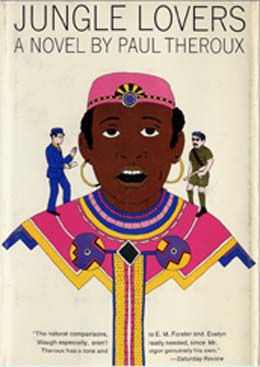
Like most RPCVs Paul Theroux has a love/hate relationship with the Peace Corps. In the essay, "Reminiscence: Malawi," which appeared in Making A Difference: The Peace Corps at Twenty-Five edited by Milton Viorst [NY: Weidenfeld & Nicholson, 1986], Theroux recalls, "I remembered all the official freeloaders who came out from Washington on so-called inspection tours, and how they tried to ingratiate themselves. 'You're doing wonderful work here. . . . It's a great little country,' they said; but for most of them it was merely an African safari. They hadn't the slightest idea of what we were doing, and our revenge was to take them on long, bumpy rides through the bush."
A lot of his reaction to the agency goes back to being kicked out of the Peace Corps. Bob Poole was the CD at the time in Malawi when Paul was a PCV. I knew Poole in those days. He had gone with our group in the fall of 1962 to Ethiopia as an APCD, then by mid-winter he had been reassigned to Nyasaland to be CD for the new Malawi Peace Corps project.
Poole had gone to Yale and played end on the football team. Short, stocky, in great physical shape, he was a prep school coach when he joined the agency in the summer of '62. I remember meeting him for the first time when we were in Training at Georgetown University. I was sitting with several other Trainees one warm afternoon on the Georgetown campus quadrangle when Poole came charging across the compound carrying a thick leather briefcase. He was heading straight for us. I thought immediately, "Wow, this guy must have some news!" He was dressed--as he was always dressed--in a polo shirt and shorts and wearing sneakers. He skidded to a stop in front of us, set down his brown leather briefcase, popped it open, and pulled out a football and asked, "anyone want to play catch?"
Dick Richter, an early evaluator with the Peace Corps, and then the Deputy Director in Kenya, 1965-67, reminds me that it was Poole who terminated Theroux's Peace Corps career. When Paul wrote Girls At Play, Theroux got back at Bob by naming the nasty Headmistress at the secondary school, Miss Poole. Writers always have the last word.
Among the other government types that Theroux disliked were foreign service officers, "all those whispering middle-aged aunties who couldn't speak the language," as Paul labeled them.
Reading his fiction and nonfiction, it is easy to see that Theroux responded best to individuals, not groups. While he might make a crudely provocative comment to a group of English settlers in a Malawi bar, (a comment like, "The Queen's a whore," as he passed her portrait hanging above the bottles of gin), he would also befriend an English neighbor, Sir Martin Roseveare, the principal of a teacher's college. (Roseveare died in Malawi in 1985 at the age of 86; he had been knighted in 1946 for designing the fraud-proof ration book in wartime Britain.)
During his time in Africa, Theroux aimed at becoming an insider, never an outsider. "After I lived awhile in a cozy bungalow with two servants," he writes about his Peace Corps tour, "I moved into an African township, where I lived in a semi-slum, in a two-room hut --cold water, cracks in the walls, tin roof, music blasting all day from the other huts, shrieks, dogs, chickens. It was just the thing. The experience greatly shaped my life." In another essay, he recalls, "In Malawi I saw my first hyena, smoked my first hashish, witnessed my first murder, caught my first case of gonorrhea." Welcome to Africa!
6. Theroux Corrects His Peace Corps History
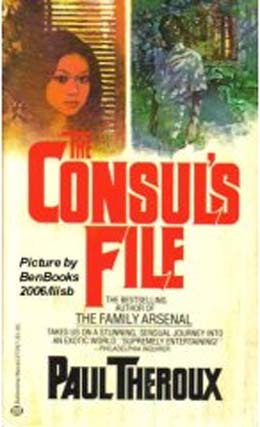
[Paul Theroux sent Coyne an email to correct the Part 5 account of his Peace Corps tour. He sets his record straight.]
"Thanks for the praise - and the blame doesn't bother me. But there are some serious inaccuracies. Mainly "a CIA plant" - this is a horrible inaccuracy. I was their sworn enemy. You must correct this. Warren Wiggins told people he admired me for various decisions I made. The Peace Corps really tried to ruin me financially and it was only my luck in getting back to Uganda that saved me from the draft. I wonder if this rumor started because the CIA while backing Dr Banda also was funnelling money to his political rival M. Chipembere, whom they later sent to LA, where he died. My friends were friends of Chipembere. Bob Poole didn't kick me out. He was gone by then. McCone was the rep and he got canned too "for poor judgement." Gilstrap was being loyal to LBJ by throwing me out - and in many respects I had been silly (involving myself with the Malawi rebel politicians) and I was also set up by the Malawi gov't agents, as I described in my piece."
My Naipaul intro (first book) isn't at all "gushing" I don't think but rather a judicious book about Naipaul who was then unknown (and badly published ) in the USA.
I always say that my Peace Corps assignment changed my life - and it's true. The volunteers were better than the organization and much better than the people who ran it; but each of us made our own PC experience, as you know.
I still believe that we changed nothing, or very little in our countries. But we were vastly changed.
If you have any specific questions by all means run them past me. I'll be happy to answer them, even though I don't have a lot of time. I am writing about my last trip, which was retracing my journey of The Great Railway Bazaar -hope to finish so it can come out next year."
[Paul is right. Bob Poole had left Malawi as the CD. He was, however, back at HQ as the Regional Director of the African Region for the Peace Corps, so in a way he would have had a role in Paul's termination. Later Poole would become deeply involved and concerned with wildlife conservation in Africa, and returned to live in Kenya. A dozen years or so after he left the Peace Corps, when working with the African Wildlife Foundtion he would be killed in an early morning car accident while driving to the Nairobi airport. Two of his children now continue his work with wildlife in Africa. As for the CIA. Which one of us hasn't at sometime or the other been labled an agent by some HCN? I do agree with Paul that we--RPCVs--have gained the most from having served in the Peace Corps. I have been trying to make the case that a Peace Corps tour, and living outside of America in the developing world, has made us all better people, better Americans, and for some of us, writers like Paul Theroux, better writers.]
7. Theroux & Tarzan & Me
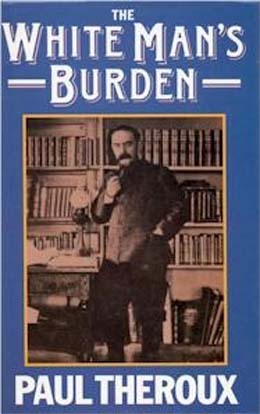
I forgot about Theroux until late in 1967, in my last months as an APCD in Ethiopia. One day, in that wonderful crammed English and French Giannopoulos Bookstore at the top of Churchill Road, just off the piazza in Addis Ababa, I picked up a copy of Transition, the Ugandan literary magazine. In it was an essay, "Tarzan is an Expatriate,," written by Paul, who was identified as a lecturer in English at Makerere University in Kampala. There was no mention of his Peace Corps days. In the essay, Theroux confessed that he spent his pre-adolescent years reading comic books inspired by the novels of Edgar Rice Burroughs. [Theroux would later tell Harris Wofford (PC Staff: D.C & Ethiopia 1962–66) - early architect of the Peace Corps and former Pennsylvania senator - that when he read Joseph Conrad's Heart of Darkness he put his finger on the title page and said, "When I grow up I shall go there."
But Theroux had gone far beyond Burroughs and understood what Tarzan - the "white man in Africa," - really meant to expatriates, missionaries and PCVs. "The expatriate has all of these rewards together with a distinct conviction that no one will bother him; he will be helped by the Africans and overrated by his friends who stayed in England or the United States. He is Tarzan, the King of the Jungle."
Reading the essay shook my beliefs about Peace Corps Volunteers in developing countries. I clipped the article and saved it. Years later, when I returned to visit Ethiopia, I found that the Peace Corps staff had mimeographed the essay and was using it for in-country training. Theroux wins again! Now, he was Training new PCVs.
8. Outsiders in Africa
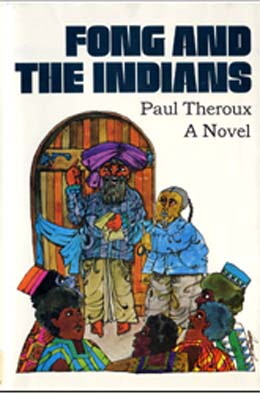
In mid-winter, 1968, I wandered into Discount Books & Records off Dupont Circle in Washington, D.C. and spotted a thin novel entitled Fong and the Indians. The author was Paul Theroux. The setting was Africa. Theroux would write later of this novel, "I began writing about the Chinese man who ran the grocery store around the corner from where I lived in Wandegeya [in Kampala, Uganda] . . . The Chinese man, his grocery store, his Indian competitors, his African customers - these were my characters . . . I had written two novels before this, but Fong was the first piece of fiction that satisfied me." Theroux would come back to this Chinese immigrant. In a New York Times Op-Ed piece about Hong Kong (June 10, 1997), he mentioned again this lone Chinese family in Africa.
What Theroux was writing about was not Africa and Africans, but about the outsiders in Africa. The Chinese man in Uganda. The British ex-pat in Malawi. The colonialist in Mozambique. And yes, Peace Corps Volunteers.
These "displaced people" in Africa fired both his curiosity and his prose. They were the source of his famous scorn, off the written page as well as on it.
9. Girls At Play
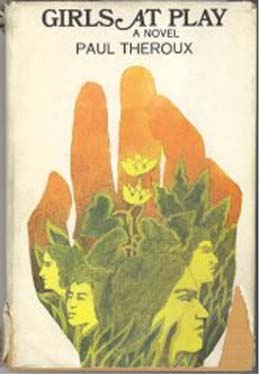
Girls At Play is Theroux's second novel based on his experiences in Africa. In this novel three white women teachers in an upcountry girls' school battle each other and Africa. It is in this book that B. J. Lebow, the first of Theroux's Peace Corps characters, appears. "It's sort of Jewish," Lebow says of her name. "It used to be Lebowitz, I guess. You probably knew that, everybody does. But I'm no Jew. I went to Israel one summer. That cured me. What a bunch of boy scouts." A San Diego liberal, she has gone to Africa to help, but can reconcile her Hollywood fantasies of Africa with her liberal outlook. The other women are Miss Poole, the Headmistress, who was born in Africa and cannot live anywhere else. She wants to run her school [and Africa] on Christian principles. The third woman is Heather Monkhouse. She has left her dull job in London to go to Africa and find love. After being fired from a teaching job in Nairobi, she arrives at the upcountry secondary school within a whirl of rumors about her past life. All of the women are trapped at the school, and spend the novel struggling to survive.
Theroux uses his Peace Corps experience also in a short story that he has said is one of his favorites, "White Lies." It was published in May, 1979 in Playboy and was included in a 40-year retrospective of Playboy fiction. Recalling the source of the story, [that I published in my collection of Peace Corps fiction, Living On The Edge: Fiction by Peace Corps Writers, Curbstone Press, 1999] Theroux writes "In Malawi, in 1964, as a Peace Corps teacher, I took a trip to the shore of Lake Malawi with some other volunteers. We were all fending for ourselves, cooking, washing, and so forth. One day I developed a strange skin condition - red bumps, pimple-like; and soon they were large and painful, erupting all over my back and shoulders. Each one held a maggot, which began as an egg laid on my shirt by a putzi fly. Using matches and tweezers my Peace Corps buddy, Bob Maccani, dug them out - Zikomo kwambiri, Bambo Bob. For years I wondered how I could use this unexpected malady, and then I came up with this story, which is still one of my favorites, and full of detail from my experience in Africa."
The short story involved a PCV (whom Theroux refers to only as a teacher) who brings home from the local bar every Saturday night, an African girl, Ameena, who does his ironing before heading back into town.
When the PCV takes up with the English headmaster's daughter, home for the holidays from her Rhodesian secondary school, Ameena delivers a "present," a shirt that, when he wears it, causes masses of tiny reddened patches, like fly bites, all over his body.
The PCV thinks he has been cursed by Ameena because he abandoned her for the pretty English girl. The fly bites turn into maggots, "their ugly heads stuck out like beads," Theroux writes. As the narrator holds a cigarette lighter near the bites to ease the maggots out of his roommate's skin, Theroux sums up, "The danger lay in their breaking: if I pulled too hard some would be left in the boil to decay, and that, I said, would kill him."
The PCV leaves Africa at once, scarred by the experience, and the story's narrator comments that the "life cycle [of the maggots] was the same as many others of their kind: they laid their eggs on laundry and these larvae hatched at body heat and burrowed into the skin to mature. Of course, laundry was always ironed - even drip-dry shirts - to kill them. Everyone who knew Africa knew that." But not this PCV.
Theroux would return to Africa in fiction in two other novels. My Secret HIstory (1989) and My Other Life (1996). These are fascinating accounts of how a writer uses his own life to create something else. I'll write about these books in upcoming blogs, but first let me tell you one story that Moritz Thomsen (Ecuador 1965-67), author of the best book on the Peace Corps, Living Poor, told me. I had asked Moritz why he titled his travel book to Brazil, The Saddest Pleasure, taking the line from Paul Theroux's Picture Palace where the Frenchman says, "Travel is the saddest of the pleasures." Thomsen replied, "It was the Frenchman who said travel was the saddest of the pleasures. I wish you had asked him. Though now it occurs to me that perhaps there was no Frenchman and Theroux just made him up; he has been known to do things like that. I once wrote Paul about his South American book, saying that he should, for aesthetic reasons, have cut his hand in Buenos Aires instead of Lima. Paul wrote back and said that actually he had cut his hand in Bogota."
The moral of this story is: never trust novelists, especially when they say they are telling you the truth.
10. A Wonderful Young Man
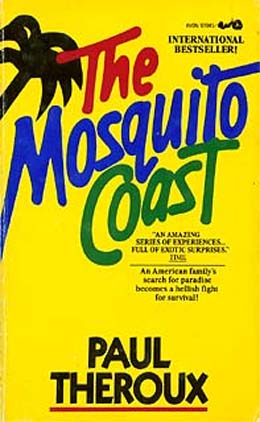
It is certainly true that Paul can get under people's skin - perhaps just as the ex-pats and others got under his skin. But not everyone has found him disagreeable and difficult. Jane Campbell Beaven, (Ethiopia Staff 1961–66) one of the great women of the early Peace Corps staff, accompanied Paul's group out to Malawi and remembers him as "charming, thoughtful and engaging. A wonderful young man."
My own encounters with him support this impression. In the late 1980s, when I was putting together a collection of Peace Corps short fiction for an anthology, I wrote Paul asking permission to reprint a story ("White Lies"), and also requesting a letter of support for the book, something that I might show publishers.
He wrote back immediately with the permission. Later he called and told me in detail how I should develop the book, what stories to choose, and how to focus the collection. He did stop at one point to say, "Well, I guess this is your book and you should do what you want." Then he went back to giving me advice - all of it good.
The book, alas, never did find a publisher. (However, Living on the Edge: Fiction by Peace Corps Writers [Curbstone Press, 1999] which I edited includes the same story by Theroux.)
11. "I'll Always be a PCV"

In 1989, Tim Carroll (Nigeria 1964-66), the executive director of what was then called the National Council of Returned Peace Corps Volunteers, (now the NPCA), organized the first of a short series of Founder's Day Dinners. It was held at the Willard Hotel in Washington, D.C., on May 29th, JFK's birthdate, as a way of celebrating the Peace Corps and returned Volunteers. While a number of Washington's glitterati were to attend, including Caroline Kennedy and the Shrivers (Maria Shriver served as MC), Tim Carroll wanted an RPCV speaker who was, as Carroll put it, "both famous and controversial, notable for achievement yet seared by the experience we would recognize as our own." Tim decided on Theroux, who was then living in London, and Paul agreed to come and participate.
Before the dinner, I found Theroux in the lobby of the Willard and introduced myself. He remembered me, asked about the book project, and we talked for a few minutes about what he was writing. At the time, I found his British accent and hauteur a bit off-putting, but writers are unconscious mimics and Theroux had spent most of his adult life among the Brits in Africa, Singapore, and England. His first wife was British. His kids were British. He seemed, however, not to love England. Remember his famous travel book about England that got everyone in London furious at him for telling it like it is?
When asked several years ago by an interviewer what was the worst place he had ever been, Theroux replied, "South London on a rainy winter afternoon, preferably on a Saturday or Sunday. Everything, literally everything, is wet, gray and dismal. Your heart is in your boots. That's definitely the pits. You simply want to shoot yourself."
I kept popping questions at hm, hoping that one or another might stir him into conversation, a little give-and-take. But he was monosyllabic, at best. Paul is well aware of his social failing. In the introduction to his collection of stories, he writes, "People who have no idea who they are talking to have told me that they love Paul Theroux's stories; yet I can see they aren't impressed with me." After a few minutes of struggling to reach common ground, we were summoned to dinner.
Theroux gave the night's address. It was long and rambling and disorganizad and made no reference to Malawi or the Peace Corps. He spoke with a pronounced British accent and mumbled a great deal. But I remember clearly his closing, when his voice softened a little and he talked about hearing the novelist Leon Uris, in a reminiscent mood, say that whatever else had happened to him in life, he always thought of himself as a young man, a Marine.
Theroux summed up by saying that whatever else he was, he would always think of hyimself as a Peace Corps Volunteer. It was a nice touch. A generous touch, considering that the Peace Corps had thrown him out of Malawi and taken away all his readjustment money, leaving him on the sidewalks of Washington, D.C., with $200 in his pocket and the draft board just around the next corner of his life. Paul, however, escaped the draft and Vietnam and has been on the run ever since.
12. If you can't trust an RPCV, who can you trust?
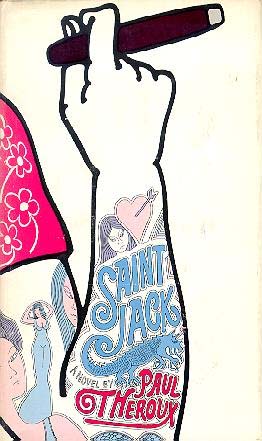
In 1994 RPCV Ron Arias (Peru 1963-64) went to Hawaii to interview Theroux for People magazine. Ron has been a long time writer for the publication. Theroux had just published a novel, Millroy the Magician, and that was how Ron was able to convince People that Theroux was a suitable subject for the magazine. Ron had recently spent time in Australia and had taken up sea kayaking, and he really wanted to talk to Theroux about his travel book, The Happy Isles of Oceania, Theroux's account of traveling through the South Pacific in a sea kayak. [You know, you just can't trust those RPCVs.]
Kayaks are sleek folding boats that can be put into the water anywhere, in the waters of Hawaii, where Theroux lives half the year, or back near his second home in Barnstable, Massachusetts.
"When I began to travel with my kayak, my life changed," Theroux told Arias. "I learned what all kayakers find out - you head for the offshore island, and often when you get there you see another, more distant island, invisible from the mainland shore. And so you are led onward, self-contained and self-reliant and utterly uplifted."
The two men went searching for a humpback whale, a half-mile off shore, in the ink-blue Kauai"s coastal water. What impressed Ron was Theroux's lack of fear, how he would approach a blowhole when other kayakers backed off.
"I want to know things," he explained, "especially if people say they're dangerous or off-limits. How else do you discover what's new and interesting?"
Afterwards, Theroux invited Ron back to his house, saying that this was something that he couldn't do with other reporters, but Ron, after all, was an RPCV.
If you can't trust an RPCV, who can you trust?
13. At the Leper Colony
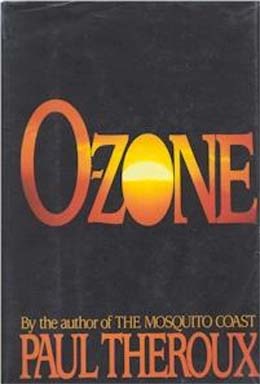
In many ways, Paul keeps going back to his Peace Corps connection. In September, 1989, he wrote a piece for National Geographic about Malawi entitled, "Faces of a Quiet Land." He traveled twice to the country to do his research for this long article. The experience was moving for him, as it usually is for RPCVs who revisits their sites and discover what happened to their students. In the National Geographic piece, he recalls his Peace Corps tour. "My classes were made up of skinny barefoot children who wanted to be doctors or lawyers. They had impressive audacity and ambition - they seemed to come from nowhere, like waifs through the mist on cold Malawi mornings, and they were claiming their place in the world." He was writing about the students at the Soche Hill Secondary School outside Limbe, where he had spent his Peace Corps years.
"I had first met them in the rainy season of 1964, when they were barefoot children in their mid-teens," he wrote of his former students in the National Geographic piece. "What a pleasure it was for me 23 years later to see that they were still alive, still well and happy, and that they had families and jobs."
It was on this journey back to Africa that he revisited the leper mission at Ntakataka, but it was closed. His remembrance of this Peace Corps experience at the Catholic mission appeared in Granta 48 (a quarterly magazine published in England) in the summer of 1994. This essay, "The Lepers of Moyo," later became Chapter Two of, My Other Life (an earlier piece on Ntakataka appeared as "Leper Colony: A Diary Entry" in the Evergreen Review in 1966.)
About Moyo, Theroux writes, "During the African school holiday, we Peace Corps teachers were told to get jobs or do something useful . . . one of my students mentioned that he was from the Central Province, near the lake. He told me the name of his village and said it was on the way to the mission hospital, Moyo."
Theroux went to the leper colony to teach English and live with the white-cassock missionary priests. He would fail at teaching English to the lepers, fail at playing cards with the missionary priests, but he would succeed in meeting two very interesting young women, Birdie, an American nurse from Indiana who dressed up like a Sister of the Sacred Heart, and the beautiful but leprous Anina who brought her blind granny to Theroux's English classes in the bandaging room of the hospital.
But how much of it is true? Did he sleep with Birdie, the wacky American nurse who wore a nun's white religious robes while being naked under the heavy garb? Or did he sleep with the leprous Amina, the girl who, lying with him on her straw mat, only inches away from her blind granny, whispered, Ndiri ndi mphere kwabasi. "I have a serious itch." That line, Theroux said in Granta, was one of the sexiest things he had ever heard. But did she say it?
That's the wonderful thing about Theroux's prose....you never know.
14. Africa Shaped Him
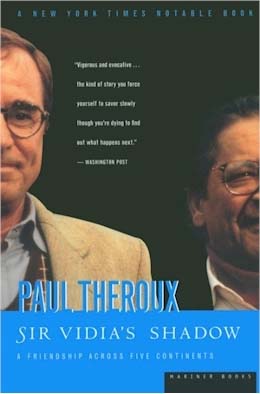
Those who write, Theroux has declared, "are disturbed, dysfunctional, cranky, incomplete, not housebroken. Why else would I write the kinds of things I write if I were a nice normal person?"
Many times, however, he can be nice and normal. He is working with travel writer Tom Miller to publish a book of remembrances of RPCV Moritz Thomsen. And lately he has even been saying nice things about RPCV books, just to help out fellow Peace Corps writers. When I write to him, I know I'll get a postcard, quickly scribbled and virtually unreadable. I need to enlarge it in the photocopier to decipher the few sentences of support, encouragement, and occasionally praise. I also get emails and suggestions and help. Theroux does not lack for opinions.
When I last spoke to him years ago in New York, it was after the publication of The Pillars of Hercules and he was doing a reading at a small upper East Side bookstore. It was a hot night, hot as one of those Mediterranean islands he had just written about, and when I arrived he was backed against a pillar by a very thin, very nervous female publicist from Putnam, his publisher. He was surprisingly relaxed and chatty in his presentation, and read a short section, took questions from the crowd of 50 or so, and told some travel stories. He linked his many journeys together, making it seem that all this travel formed an orderly career and was not just done for random assignments that carried him away to far-off places.
Theroux finished talking about travel and the Mediterranean and his book, and accepted the polite East Side applause. Then there were copies of the book to be signed. Before he left, I introduced myself and we talked briefly, but he was anxious to leave. His son was there, waiting for him.
When he was gone, I wished I had made more of the exchange, or had asked him to lunch. I recalled Ron Arias's account of being with Theroux in Hawaii and meeting a middle-aged hitchhiker who said he had just beaten up his best friend. Theroux, says Ron, immediately began to interrogate the man, hungry always for anything dangerous, off-limits, at the edge.
But the moment was gone. I'd write him, I told myself, and get yet another illegible postcard from Hawaii. Or somewhere else in the world. In the years since, I have had contact with him. We did a long interview when his book traveling through Africa that was published on our website: www.peacecorpswriters.org,.
Paul is still in touch with the Volunteers he served with in Africa and every summer there is a gathering of the Malawi RPCVs at his place on the Cape with seven to ten RPCVs from his group also turning up. Whenever I write about him, some RPCV or staff person will send along their story of meeting up with Paul somewhere 'out there' and how nice he had been to them.
I have attended any number of his readings over the years, mostly in New York City, and always the book store is jammed with his fans and he reads and takes questions and plows through many of the old stories once again, reliving what someone had said about him, what and when. It must seem to Paul that he is a million dollar movie playing over and over again on a Saturday afternoon. Did Hemingway have to endure this?
Since beginning this recent small collection of blog remarks about Theroux I have received a number of emails, most from senders who would not post their comments, and many wanting to know why I was spending so much time on Theroux. There are many out there in PeaceCorpsland who dislike Paul Theroux, and everything that he has written.
But not as many as those who find him a wonderful writer and are always waiting for his next book.
I'm one of the later. I think Paul Theroux is one of the best writers we have produced in America since the Vietnam War. It doesn't matter that he once was a Peace Corps Volunteer. It's nice. It adds a little gloss to our collection of fine writers who were once in the Peace Corps.
There are others fine Peace Corps writers, writers who are not as famous or successful as Paul's, but of all of them, Theroux has produced the best writing for the longest time. We have to give the man his due.
Few of us, RPCVs or otherwise, have his talent for language, or his stamina to do what he has done for forty plus years. It is easier, of course, not to try. It's always easier to stay behind at the gymkhana and not go native. It's always easier not to write at all. But Theroux is still at it. And he began in the Peace Corps in Africa. It was those early years in Malawi that shaped his future and his writings. It is in Africa, he has said, where he discovered what to write, and why.
About John Coyne
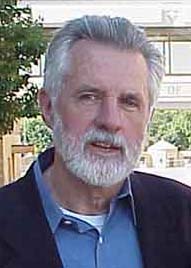
John Coyne, editor of the Peace Corps Writers web site, served as a Peace Corps Volunteer in Ethiopia in the 1960's. The pieces in this article first appeared in his blog, John Coyne Babbles. Our thanks for his permission to collect and reprint them.
Links to Related Topics (Tags):
Headlines: August, 2007; RPCV Paul Theroux (Malawi); Figures; Peace Corps Malawi; Directory of Malawi RPCVs; Messages and Announcements for Malawi RPCVs; Writing - Malawi
When this story was posted in August 2007, this was on the front page of PCOL:





Peace Corps Online The Independent News Forum serving Returned Peace Corps Volunteers
 | Senator Dodd's Peace Corps Hearings
Read PCOL's executive summary of Senator Chris Dodd's hearings on July 25 on the Peace Corps Volunteer Empowerment Act and why Peace Corps Director Ron Tschetter does not believe the bill would contribute to an improved Peace Corps while four other RPCV witnesses do. Highlights of the hearings included Dodd's questioning of Tschetter on political meetings at Peace Corps Headquarters and the Inspector General's testimony on the re-opening of the Walter Poirier III investigation. |
 | Dodd issues call for National Service
Standing on the steps of the Nashua City Hall where JFK kicked off his campaign in 1960, Presidential Candidate Chris Dodd issued a call for National Service. "Like thousands of others, I heard President Kennedy's words and a short time later joined the Peace Corps." Dodd said his goal is to see 40 million people volunteering in some form or another by 2020. "We have an appetite for service. We like to be asked to roll up our sleeves and make a contribution," he said. "We haven't been asked in a long time." |
 | Public diplomacy rests on sound public policy
When President Kennedy spoke of "a long twilight struggle," and challenged the country to "ask not," he signaled that the Cold War was the challenge and framework defining US foreign policy. The current challenge is not a struggle against a totalitarian foe. It is not a battle against an enemy called "Islamofascism." From these false assumptions flow false choices, including the false choice between law enforcement and war. Instead, law enforcement and military force both must be essential instruments, along with diplomacy, including public diplomacy. But public diplomacy rests on policy, and to begin with, the policy must be sound. Read more. |
 | Ambassador revokes clearance for PC Director
A post made on PCOL from volunteers in Tanzania alleges that Ambassador Retzer has acted improperly in revoking the country clearance of Country Director Christine Djondo. A statement from Peace Corps' Press Office says that the Peace Corps strongly disagrees with the ambassador’s decision. On June 8 the White House announced that Retzer is being replaced as Ambassador. Latest: Senator Dodd has placed a hold on Mark Green's nomination to be Ambassador to Tanzania. |
 | Peace Corps Funnies
A PCV writing home? Our editor hard at work? Take a look at our Peace Corps Funnies and Peace Corps Cartoons and see why Peace Corps Volunteers say that sometimes a touch of levity can be one of the best ways of dealing with frustrations in the field. Read what RPCVs say about the lighter side of life in the Peace Corps and see why irreverent observations can often contain more than a grain of truth. We'll supply the photos. You supply the captions. |
 | PCOL serves half million
PCOL's readership for April exceeded 525,000 visitors - a 50% increase over last year. This year also saw the advent of a new web site: Peace Corps News that together with the Peace Corps Library and History of the Peace Corps serve 17,000 RPCVs, Staff, and Friends of the Peace Corps every day. Thanks for making PCOL your source of news for the Peace Corps community. Read more. |
 | Suspect confesses in murder of PCV
Search parties in the Philippines discovered the body of Peace Corps Volunteer Julia Campbell near Barangay Batad, Banaue town on April 17. Director Tschetter expressed his sorrow at learning the news. “Julia was a proud member of the Peace Corps family, and she contributed greatly to the lives of Filipino citizens in Donsol, Sorsogon, where she served,” he said. Latest: Suspect Juan Duntugan admits to killing Campbell. Leave your thoughts and condolences . |
 | Warren Wiggins: Architect of the Peace Corps
Warren Wiggins, who died at 84 on April 13, became one of the architects of the Peace Corps in 1961 when his paper, "A Towering Task," landed in the lap of Sargent Shriver, just as Shriver was trying to figure out how to turn the Peace Corps into a working federal department. Shriver was electrified by the treatise, which urged the agency to act boldly. Read Mr. Wiggins' obituary and biography, take an opportunity to read the original document that shaped the Peace Corps' mission, and read John Coyne's special issue commemorating "A Towering Task." |
 | Chris Dodd's Vision for the Peace Corps
Senator Chris Dodd (RPCV Dominican Republic) spoke at the ceremony for this year's Shriver Award and elaborated on issues he raised at Ron Tschetter's hearings. Dodd plans to introduce legislation that may include: setting aside a portion of Peace Corps' budget as seed money for demonstration projects and third goal activities (after adjusting the annual budget upward to accommodate the added expense), more volunteer input into Peace Corps operations, removing medical, healthcare and tax impediments that discourage older volunteers, providing more transparency in the medical screening and appeals process, a more comprehensive health safety net for recently-returned volunteers, and authorizing volunteers to accept, under certain circumstances, private donations to support their development projects. He plans to circulate draft legislation for review to members of the Peace Corps community and welcomes RPCV comments. |
 | He served with honor
One year ago, Staff Sgt. Robert J. Paul (RPCV Kenya) carried on an ongoing dialog on this website on the military and the peace corps and his role as a member of a Civil Affairs Team in Iraq and Afghanistan. We have just received a report that Sargeant Paul has been killed by a car bomb in Kabul. Words cannot express our feeling of loss for this tremendous injury to the entire RPCV community. Most of us didn't know him personally but we knew him from his words. Our thoughts go out to his family and friends. He was one of ours and he served with honor. |
Read the stories and leave your comments.

Some postings on Peace Corps Online are provided to the individual members of this group without permission of the copyright owner for the non-profit purposes of criticism, comment, education, scholarship, and research under the "Fair Use" provisions of U.S. Government copyright laws and they may not be distributed further without permission of the copyright owner. Peace Corps Online does not vouch for the accuracy of the content of the postings, which is the sole responsibility of the copyright holder.
Story Source: John Coyne Babbles
This story has been posted in the following forums: : Headlines; Figures; COS - Malawi; Writing - Malawi
PCOL44085
21
|
By former vol (dialup-4.156.69.34.dial1.boston1.level3.net - 4.156.69.34) on Saturday, August 18, 2007 - 12:53 pm: Edit Post |
Paul Theroux is the perfect hippie within Peace Corps, the beatnick who stirred the pot, that pissed off the bureaucracy and they tried to ruin him. In a progressive administration to come, we should ask him to be Director of Africa or a consultant to Peace Corps to recognize and acknowledge, that we as former volunteers, don't go along with ruining other volunteers.
Peace Corps motivated Paul too, commercially, to write by casting him off with no money or reference. Thank god he was able to make a good living. As a tribute to him, buy his latest novel.
Hasting Banda is not the "lion for life". His legacy will never match the literacy legacy of Paul and what he brought us.
Keep it up Paul and thanks John for your research, great work.
former volunteer


































